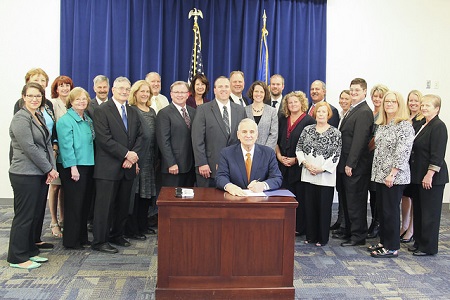In Minnesota, 2015 will go down in history as a good year for mental health. The 2015 legislative session provided $51 million in new funding for a number of mental health initiatives. An excellent summary of the 2015 Minnesota Legislative session can be found on the following link from the Minnesota Chapter of the National Alliance on Mental Illness:
http://www.namihelps.org/2015-NAMI-Minnesota-Legislative-Summary.pdf
If you enjoy politics and want to be engaged in the political process on behalf of psychologists, the Legislative Committee of the Minnesota Psychological Association (MPA) is already thinking ahead to the 2016 and 2017 legislative sessions. This committee, chaired by Trisha Stark, works closely with MPA’s lobbyist to implement MPA’s legislative agenda. During the legislative session, this committee tracks the initiatives that are of interest to MPA and psychologists in general, as well as initiatives that impact the psychological well-being of Minnesota citizens. In 2015, MPA provided letters of support and lobbied for a number of the 2015 initiatives. MPA members volunteered or were appointed to participate in various steering committees, task forces, or first implementers groups. Thank you to all who made 2015 “the year for mental health.”

Governor Mark Dayton signs mental health bill. MPA President Scott Palmer and Legislative Chair Trisha Stark were present.

From left to right, MPA President Scott Palmer, Governor Mark Dayton and Legislative Chair Trisha Stark.
The Minnesota Legislature meets each year and functions on a two-year cycle called a biennium. The first year of the biennium or the odd-numbered year is called the “long year” and lasts from January to mid-May. This first year of the biennium is also considered the “budget session” and is used for the major financial planning for the State. The second year of the biennium or the even-numbered year is called the “short year” and is considered to be a time for budget review, action on the results of interim studies, and consideration of emergency measures. Action can also be taken on business leftover from the first session. In 2016, the Legislature is scheduled to begin on Tuesday, March 8, 2016, at noon.
The Minnesota Psychological Association (MPA) has identified four legislative initiatives and priorities during the 2016 session that require substantial time and action from our legislative committee, lobbyist, and legislative consultant. These initiatives are as follows:
1. Duty to Warn Laws: The duty to warn laws in Minnesota are embedded in our state licensing statutes as part of the Psychology Practice Act. A very literal interpretation of the duty to warn statute (Minnesota Statute 148.975) was applied in a recent Minnesota Court of Appeals decision that now puts all psychology interns, post docs, and unlicensed providers receiving supervision at risk for liability and claims of breach of privacy. The Minnesota law states: “The duty to predict, warn of, or take reasonable precautions to provide protection from, violent behavior arises only when a client or other person has communicated to the licensee a specific, serious threat of physical violence against a specific, clearly identified or identifiable potential victim. If a duty to warn arises, the duty is discharged by the licensee if reasonable efforts, as defined in subdivision 1, paragraph (c), are made to communicate the threat.”
At issue with this law is that it provides clear guidance and immunity from liability in duty to warn situations for a licensee. What is not clear in this statute is how this impacts interns, post-docs, unlicensed providers seeking licensure, and their supervisors. In the Minnesota Court of Appeals decision (Expose v. Thad Wilderson and Associates), the impact of the decision is that an exception to confidentiality and the immunity from liability in duty-to-warn situations is not offered to an unlicensed mental health provider.
MPA has retained legal counsel and filed a petition for Amicus review now that this case has been appealed to the Minnesota Supreme Court. Should the Minnesota Court of Appeals decision be affirmed, it would have negative impact to all internship and post-doctoral training programs as well as any supervisors who provide training and supervision to unlicensed providers. During the 2016 legislative session, MPA will work with our legislators to write a duty-to-warn statute that offers interns, post-docs, and unlicensed providers seeking licensure the same statutory guidance, protections, and immunity from liability as licensees in duty-to-warn situations. MPA has made APA aware of this issue that could have State and National implications for psychology training programs.
2. Medicaid fee schedule increase: During the 2015 legislative session, MPA worked collectively with the other professions on a 23.7% increase in Medicaid rates for mental health providers in Minnesota. A 23.7% increase in the Medicaid fee schedule was previously provided over the rates in effect on January 1, 2006 for a.) Psychiatrists and advanced practice nurses with psychiatric specialty; b.) Community mental health centers, and c.) Mental health clinics or hospital outpatient psychiatric departments that are designated as essential community providers.
The bill to provide this same 23.7% rate adjustment to all mental health professionals as defined under section 245.462 passed in the house and senate, yet the funding did not make it into the omnibus bills. This issue will remain as a legislative priority of MPA and our lobbyist. In 2016, MPA will be laying the groundwork for passage in the next budget year of 2017.
3. Funding to support psychologists who supervise interns: In an effort to improve access and the capacity to provide mental health treatment, the Health Workforce commission has proposed working on a bill to be included as part of the tax package that would provide either a payment to or tax credits or exemptions to psychologists who supervise students. In this bill, there were requirements about the number of hours that must be provided, and in this proposal they were thinking of either an outright payment of $1500 or a tax exemption of $10,000. The Health Workforce commission is looking at this as a mechanism to create and maintain more supervisors for students.
While MPA is not directly responsible for this bill, we certainly will want to support it with lobbying efforts with our legislators and in the tax committee as a vehicle for encouraging training, especially in rural areas where it is difficult to obtain supervisors for students. The bill also offers grant funding to programs to develop more slots for training positions.
4. Funding for Psychologists for the Adoption of Electronic Health Records (EHR): In 2007 the Minnesota Legislature mandated the Electronic Health Record Technology Statute, §62J.495, also known as the 2015 EHR Mandate, which states “[b]y January 1, 2015, all hospitals and health care providers must have in place an interoperable electronic health records system within their hospital system or clinical practice setting.” This mandate was met with opposition after the January 1 deadline arrived, with calls for repeal. During the 2015 legislative session, an amendment did pass that exempted providers in solo or cash-only practices.
In an effort to provide support for the adoption of interoperable electronic health records, the Minnesota Department of Health has proposed a bill that would provide grant funding for EHR adoption for behavioral health providers. Solo or small practice providers often lack the financial or technical support that benefits hospitals and large clinics and therefore, the proposed bill would be a great help to psychologists in managing the costs of EHR adoption.
During the 2015 legislative session, the chairs of Health and Human Services agreed in principle to provide these grant funds, so additional lobbying efforts will help move this legislation forward. Members of MPA’s Executive and Legislative Committee recently met with the Minnesota Department of Health on this issue and are exploring options to propose for the 2016 and 2017 session.
MPA is aware that additional initiatives and priorities will come up as we move closer to the 2016 legislative session, and invite all MPA members to connect early on with the executive and legislative committee if your ideas need attention during the 2016 session. Thanks again to all who worked so hard to make 2015 a great year for mental health initiatives.
Scott Palmer, Ph.D., is the Director of the Behavioral Health Clinic at St. Cloud Hospital, an assistant adjunct professor at the College of St. Benedict/St. John’s University, and is President of the Minnesota Psychological Association. He is a volunteer member of the Red Cross, where he provides psychological first aid to survivors of local or national disasters. He is a member of the Motivational Interviewing Network of Trainers (MINT) and uses MI in his practice to help people move toward positive change.




